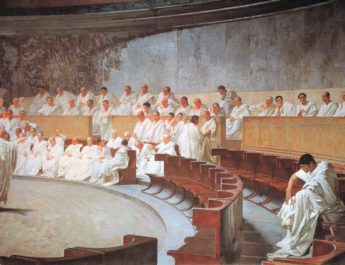1 Peter 1:3-9
Second Sunday of Easter A
3 BlessedI be the GodII and FatherIII
I “blessed” = eulogetos. 8x in NT. From eulogeo (speaking well of – speaking so that the other is benefited; praise, bless, thank, or call for a blessing); {from eu (good, well, well done, rightly) + logos (word, statement, speech, analogy; a word that carries an idea or expresses a thought, a saying; a person with a message or reasoning laid out in words; by implication, a topic, line of reasoning, or a motive; can be used for a divine utterance or as Word – Christ); {from lego (to speak, tell, mention)}}. This is blessed, spoken well of, to be praiseworthy, or adorable. This is the root that “eulogy” comes from.
II “God” = Theos. From Proto-Indo-European origins, meaning do, put, place. This is God or a god in general.
III “Father” = Pater. This is father in a literal or figurative sense. Could be elder, senior, ancestor, originator, or patriarch.
of our LordIV JesusV Christ!VI
IV “Lord” = Kurios. From kuros (authority, supremacy). This is a respectful address meaning master or sir. It refers to one who has control or power greater than one’s own. So, it was also applied to God and Jesus as Master or Lord.
V “Jesus” = Iesous. From Hebrew Yehoshua (Joshua, the Lord is salvation); {from YHVH (proper name of the God of Israel; the self-existent and eternal one); {from havah (to become) or from hayah (to come to pass, become, be)} + yasha (to deliver, defend, help, preserve, rescue; properly, to be open, wide or free, which implies being safe. So, in a causative sense, this is to free someone)}. This is Jesus or Joshua in Greek – the Lord saves or the Lord is salvation.
VI “Christ” = Christos. From chrio (consecrate by anointing with oil; often done for prophets, priests, or kings). Literally, the anointed one, Christ. The Greek word for Messiah.
By his greatVII mercyVIII he has given us a new birthIX
VII “great” = polus. This is much, often, plenteous – a large number or a great extent.
VIII “mercy” = eleos. This is mercy, pity, tender mercy, or compassion, whether from humans or from God. This is mercy, generally understood in action by word or deed. When we sing or say “kyrie eleison” (Lord, have mercy), it is related to this word.
IX “given…a new birth” = anagennao. 2x in NT. From ana (up, again, back, among, anew) + gennao (to beget, give birth to, or bring forth; properly, procreation by the father, but used of the mother by extension; figuratively, to regenerate); from genna (descent, birth); from genos (family, offspring, kin – in a literal or figurative sense); from ginomai (to come into being, to happen, become, be born; to emerge from one state or condition to another; this is coming into being with the sense of movement or growth). This is to be born anew or from above. It is Christian regeneration.
into a livingX hopeXI through the resurrectionXII of Jesus Christ from the deadXIII
X “living” = zao. This is to live literally or figuratively. It is used for life including the vitality of humans, plants, and animals – it is life physical and spiritual and life everlasting.
XI “hope” = elpis. From elpo (to anticipate, welcome, expect; usually to anticipate positively). This is expectation, hope, trust, confidence faith. The expectation can be abstract or concrete.
XII “resurrection” = anastasis. From anistemi (to raise up, rise, appear; to stand up literally or figuratively. Can also mean to resurrect); from ana (upwards, up, again, back, anew) + histemi (to make to stand, place, set up, establish, appoint, stand by, stand still, stand ready, stand firm, be steadfast). This is literally standing up or standing again. It is used figuratively for recovering a spiritual truth. It can be raising up, rising, or resurrection.
XIII “dead” = nekros. Perhaps from nekus (corpse). This is dead or lifeless, mortal, corpse. It can also be used figuratively for powerless or ineffective. It is where the word “necrotic” comes from.
4 and into an inheritanceXIV that is imperishable,XV undefiled,XVI
XIV “inheritance” = kleronomia. 14x in NT. From kleronomos (heir); {from kleros (lot, portion, heritage; that share assigned to you; also a lot used to determine something by fate, chance, or divine will); {perhaps from klero (casting a lot) or from klao (to break in pieces as one breaks bread)} + the same as nomos (what is assigned – usage, law, custom, principle; used for the law in general or of God’s law; sometimes used to refer to the first five books of the Bible or the entire Old Testament; also used to refer to theology or the practice and tradition of interpreting and implementing the law of God); {from nemo (to parcel out, assign)}}. This is inheritance, heritage, or possession.
XV “imperishable” = aphthartos. 8x in NT. From a (not, without) + phtheiro (to destroy, corrupt, ruin, deteriorate, wither; also used of moral corruption); from phthio (perish, waste away). This is imperishable, undecaying, immortal, incorruptible.
XVI “undefiled” = amiantos. 4x in NT. From a (not, without) + miaino (to stain, corrupt, pollute; literally, to stain or dye; figuratively, to defile as sin taints one; to contaminate ritually or morally). This is undefiled, unstained, unsoiled. Figuratively, this means pure.
and unfading,XVII keptXVIII in heavenXIX for you,
XVII “unfading” = amarantos. 1x in NT. From a (not, without) + maraino (to waste away, wither, fade, pass away). This is unfading or enduring, perpetual.
XVIII “kept” = tereo. From teros (a guard or a watch that guards keep); perhaps related to theoreo (gazing, beholding, experiencing, discerning; looking at something to analyze it and concentrate on what it means; the root of the word “theatre” in that people concentrate on the action of the play to understand its meaning); from theaomai (to behold, look upon, see, contemplate, visit); from thaomai (to gaze at a spectacle; to look at or contemplate as a spectator; to interpret something in efforts to grasp its significance); from theoros (a spectator or envoy). This is to guard, observe, keep, maintain, or preserve. It can also be used f iguratively for spiritual watchfulness. It is guarding something from being lost or harmed – keeping an eye on it. Contrast the Greek phulasso, which is to guard something so that it doesn’t escape. Also contrast koustodia, which generally denotes a fortress or military presence. This word can mean fulfilling commands, keeping in custody, or maintaining. It can also figuratively mean to remain unmarried.
XIX “heaven” = ouranos. May be related to oros (mountain, hill) with the notion of height. This is the air, the sky, the atmosphere, and heaven. It is the sky that is visible and the spiritual heaven where God dwells. Heaven implies happiness, power, and eternity.
5 who are being protectedXX by the powerXXI of God through faithXXII for a salvationXXIII
XX “protected” = phroureo. 4x in NT. From phrouros (a guard) OR from pro (before, in front of, earlier than) + horao (to see, perceive, attend to, look upon, experience; to stare at, which implies clear discernment; by extension, attending to what was seen and learned; to see, often with a metaphorical sense, which can include inward spiritual seeing). This is to guard, keep, or protect. It is to guard or keep watch as by a military sentinel. Figuratively, it is using active defensive or offensive tactics to guard.
XXI “power” = dunamis. From dunamai (to be able, have power or ability). This is might, strength, physical power, efficacy, energy, and miraculous power. It is force literally or figuratively – the power of a miracle or the miracle itself.
XXII “faith” = pistis. From peitho (to have confidence, urge, be persuaded, agree, assure, believe, have confidence, trust). This is less about knowing, believing, and repeating a list of doctrines then it is about trusting God. Faith means listening to God and seeking to live a holy life even (and especially) when we don’t understand how everything works or fits together. Faith is about being faithful (trusting and doing) rather than being all knowing.
XXIII “salvation” = soteria. From soter (a savior, deliverer); from sozo (to save, heal, preserve, or rescue; taking someone from danger to safety; delivering or protecting literally or figuratively); from sos (safe, rescued, well). This is deliverance, salvation, preservation, welfare, prosperity, safety.
readyXXIV to be revealedXXV in the lastXXVI time.XXVII
XXIV “ready” = hetoimos. 17x in NT. From heteos (fitting, fitness). This is make ready, be ready because of being prepared, standing by, adjusted; ready to meet some opportunity or challenge.
XXV “revealed” = apokalupto. From apo (from, away from) + kalupto (to cover, hide, conceal; figuratively, to keep hidden or secret) {related to kalube (hut, cabin)}. This is properly to uncover so it means revealing something that was hidden or obstructed. It particularly refers to revealing the essence of something. This is to make plain or manifest. This is the root verb that “apocalypse” comes from.
XXVI “last” = eschatos. Related to eschaton (end, last); perhaps from echo (to have, possess, hold). This is last, end, extreme, final. It is often used to discuss the end times, prophecies of the future, and the afterlife. The branch of theology focusing on all these topics is called “eschatology.”
XXVII “time” = kairos. This is season, opportunity, occasion. The word chronos is used for chronological time. Kairos is used for spiritually significant time – the right time or appointed time.
6 In this you rejoice,XXVIII even if now for a little whileXXIX you have hadXXX
XXVIII “rejoice” = agalliao. 11x in NT. From agallomai (to exalt, make glorious) {from agan (much, very) + hallomai (to leap or leap up; when referring to water, springing up or bubbling up; to jump or figuratively to gush)}. This is properly joy that prompts you to jump up. It is a full body experience of joy: exulting, rejoicing, or even boasting from joy.
XXIX “for a little while” = oligos. This is few or small – it can be a short time or extent, low light, amount, or worth.
XXX “had” = dei. From deo (to tie, bind, compel; declare unlawful). This is what is necessary or proper. It is what is needed or what one should do – a duty or something inevitable. This refers to something absolutely necessary.
toXXXI sufferXXXII variousXXXIII trials,XXXIV
XXXI {untranslated} = eimi. This is to be or exist.
XXXII “suffer” = lupeo. From lupe (pain, whether physical or mental; grief, sorrow, distress, a heavy heart). This is to be sad, grieve, distress, hurt, feel pain. It can be used for deep pain or severe sorrow as well as the pain that accompanies childbirth.
XXXIII “various” = poikilos. 10x in NT. This is varied, diverse, having different colors or varied character.
XXXIV “trials” = peirasmos. From peirazo (to test, try, tempt, or make proof of, scrutinize, or assay something; could also be examine, entice, prove, or discipline); from peira (trial, experiment, attempt, experience, assaying); from the base of peran (over, beyond, across); akin to pera (on the far side); from a derivative or peiro (to pierce). This is a test as in an experiment or assaying. It is also trial, temptation, and discipline. Further, it could be used to mean calamity, affliction, or adversity more generally.
7 so that the genuinenessXXXV of your faith—being more preciousXXXVI than goldXXXVII that,
XXXV “genuineness” = dokimion. 2x in NT. From dokimos (what passes the test, approved, acceptable, genuine, verified); from dechomai (to warmly receive, be ready for what is offered, take, accept, or welcome; to receive in a literal or figurative sense) or dokeo (to have an opinion, seem, appear, suppose; a personal judgment; to think); {from dokos (opinion)}. This is testing, genuineness, proof, or trustworthiness.
XXXVI “more precious” = polutimos. Related to “great” in v3. 3x in NT– including the pearl of great price in Matthew 13:46. From polus (see note VII above) + time (worth or something’s perceived value; literally, price, but figuratively, the honor or value one sees in someone or something else; also esteem or dignity; also precious or valuables); {From tino (to pay, be punished, pay a penalty or fine because of a crime); from tio (to pay respect, value)}. This is very precious, valuable, or costly.
XXXVII “gold” = chrusion. 12x in NT. From chrusos (gold or something made of gold; symbolic of purchasing power); perhaps from chraomai (to use, make use of, give what is needed, act in a specific way, request). This is gold or something made of gold. Emphasizes that which gold can obtain.
though perishable,XXXVIII is testedXXXIX by fireXL—may be foundXLI
XXXVIII “perishable” = apollumi. From apo (from, away from) + ollumi (to destroy or ruin; the loss that comes from a major ruination). This is to destroy, cut off, to perish – perhaps violently. It can also mean to cancel or remove.
XXXIX “tested” = dokimazo. Related to “genuineness” in v7. From dokimos (see note XXXV above). This is to test, examine, prove. It is to approve after subjecting to a test to determine if it is real or acceptable. It is to test in a literal or figurative sense.
XL “fire” = pur. This is fire, lightning, heat from the sun. Figuratively, it can refer to strife or trials.
XLI “found” = heurisko. This is to find, learn, or obtain. It is to discover something, which generally implies a period of searching for it. This is to find in a literal or figurative sense. This is where the word “heuristic” comes from.
to result in praiseXLII and gloryXLIII and honorXLIV when Jesus Christ is revealed.XLV
XLII “praise” = epainos. 11x in NT. From epi (on, upon, to, what is fitting) + ainos (praise, saying, story, proverb). This is fitting praise, fame, approval. It is recognizing something or someone that is deserving of praise.
XLIII “glory” = doxa. Related to “genuineness” and “tested” in v7. From dokeo (see note XXXV above).This is literally something that evokes a good opinion – something that connects to our understanding of intrinsic worth. The ultimate expression of this is, of course, God and God’s manifestation. So, this is opinion, honor, and dignity, but also praise, glory, renown, and worship.
XLIV “honor” = time. Related to “more precious” in v7. See note XXXVI above.
XLV “revealed” = apokalupsis. Related to “revealed” in v5. 18x in NT. From apokalupto (see note XXV above). This is uncovering, unveiling, appearing, manifestation, or revelation. This is where the word “apocalypse” comes from.
8 Although you have not seenXLVI him, you loveXLVII him, and even though you do not see him now, you believeXLVIII in him
XLVI “seen” = horao. Related to “protected” in v5. See note XX above.
XLVII “love” = agapao. Related to “rejoice” in v6. Perhaps from agan (see note XXVIII above). This is love, longing for, taking pleasure in. It is divine love or human love that echoes divine love.
XLVIII “believe” = pisteuo. Related to “faith” in v5. From pistis (see note XXII above). This is to believe, entrust, have faith it, affirm, have confidence in. This is less to do with a series of beliefs or doctrines that one believes and more to do with faithfulness, loyalty, and fidelity. It is trusting and then acting based on that trust.
and rejoice with an indescribableXLIX and gloriousL joy,LI
XLIX “indescribable” = aneklaletos. 1x in NT. From a (not, without) + eklaleo (to tell, disclose, speak out); {from ek (from, from out of) + laleo (to talk, say, utter, preach); {from lalos (talkative)}}. This is unspeakable or inexpressible. This is something that is impossible to express fully in words.
L “glorious” = doxazo. Related to “genuineness” and “tested” and “glory” in v7. From doxa (see note XLIII above). This is to render or hold something as glorious, to glorify, honor, magnify, or celebrate. This is ascribing weight to something by recognizing its true value or essence.
LI “joy” = chara. From chairo (to rejoice, be glad or cheerful; a greeting); from char– (to extend favor, lean towards, be inclined to be favorable towards). This is joy, delight, gladness. Can be understood as the feeling you get when you are aware of grace.
9 for you are receivingLII the outcomeLIII of your faith, the salvation of your souls.LIV
LII “receiving” = komizo. 10x in NT. From komeo (to tend or take care of). This is to carry, bring, recover, or recompense. It is receiving something that was lost or promised. Also, to provide for – as carrying someone out of harm’s way.
LIII “outcome” = telos. From tel– (to reach a goal or aim); This is an end, aim, purpose, completion, goal, consummation, or tax. It is completing a stage of something and everything that results from that completion. It can be literal or figurative.
LIV “souls” = psuche. From psucho (to breathe, blow). This is breath, the breath of life, the self, individual, soul. This is the word for that which makes a person unique – their identity, will, personality, affections. This isn’t the soul as the immortal part of us, but as our individuality. It is also not life as a general concept, but specific to people. This is where the words psyche and psychology come from.
Image credit: “Resurrection” by Eric Gill, 1917.




